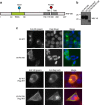A protein-truncating R179X variant in RNF186 confers protection against ulcerative colitis
- PMID: 27503255
- PMCID: PMC4980482
- DOI: 10.1038/ncomms12342
A protein-truncating R179X variant in RNF186 confers protection against ulcerative colitis
Erratum in
-
Erratum: A protein-truncating R179X variant in RNF186 confers protection against ulcerative colitis.Nat Commun. 2016 Sep 13;7:12869. doi: 10.1038/ncomms12869. Nat Commun. 2016. PMID: 27619887 Free PMC article. No abstract available.
Abstract
Protein-truncating variants protective against human disease provide in vivo validation of therapeutic targets. Here we used targeted sequencing to conduct a search for protein-truncating variants conferring protection against inflammatory bowel disease exploiting knowledge of common variants associated with the same disease. Through replication genotyping and imputation we found that a predicted protein-truncating variant (rs36095412, p.R179X, genotyped in 11,148 ulcerative colitis patients and 295,446 controls, MAF=up to 0.78%) in RNF186, a single-exon ring finger E3 ligase with strong colonic expression, protects against ulcerative colitis (overall P=6.89 × 10(-7), odds ratio=0.30). We further demonstrate that the truncated protein exhibits reduced expression and altered subcellular localization, suggesting the protective mechanism may reside in the loss of an interaction or function via mislocalization and/or loss of an essential transmembrane domain.
Conflict of interest statement
K.S. and his team report personal fees from deCODE Genetics/Amgen outside the submitted work. The remaining authors declare no competing financial interests.
Figures

References
Publication types
MeSH terms
Substances
Grants and funding
- U54 DE023789/DE/NIDCR NIH HHS/United States
- U01 DK062413/DK/NIDDK NIH HHS/United States
- U01 HG005923/HG/NHGRI NIH HHS/United States
- P30 DK043351/DK/NIDDK NIH HHS/United States
- UL1 TR001863/TR/NCATS NIH HHS/United States
- R01 DK064869/DK/NIDDK NIH HHS/United States
- U01 DK062429/DK/NIDDK NIH HHS/United States
- MC_PC_15018/MRC_/Medical Research Council/United Kingdom
- U01 DK062422/DK/NIDDK NIH HHS/United States
- G0800759/MRC_/Medical Research Council/United Kingdom
- MR/J00314X/1/MRC_/Medical Research Council/United Kingdom
- ETM/137/CSO_/Chief Scientist Office/United Kingdom
- MC_UU_12010/7/MRC_/Medical Research Council/United Kingdom
- P30 DK089502/DK/NIDDK NIH HHS/United States
- U01 DK062432/DK/NIDDK NIH HHS/United States
- WT_/Wellcome Trust/United Kingdom
- U01 DK062423/DK/NIDDK NIH HHS/United States
- U01 AI067068/AI/NIAID NIH HHS/United States
- P01 DK046763/DK/NIDDK NIH HHS/United States
- U01 DK062420/DK/NIDDK NIH HHS/United States
- U01 DK062431/DK/NIDDK NIH HHS/United States
- R01 DK092235/DK/NIDDK NIH HHS/United States
- G0600329/MRC_/Medical Research Council/United Kingdom
- NIHR-RP-R3-12-026/DH_/Department of Health/United Kingdom
LinkOut - more resources
Full Text Sources
Other Literature Sources
Medical

